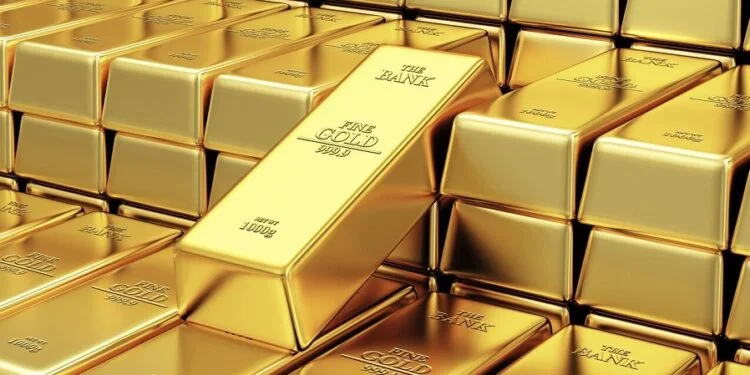Gold prices has hit record $3,800 as global central banks accelerate buying spree.
NewsOnline Nigeria reports that the price of gold has surged by 42.8% between September 2024 and September 2025, smashing previous records to reach $3,650 per ounce and briefly topping $3,800 in early October.
The rally is driven by a combination of a weaker U.S. dollar, persistent inflation, and growing geopolitical tensions that have sent investors and central banks rushing toward the precious metal.
For Nigeria, this surge translates into a significant windfall. The country’s 687,402 troy ounces of gold (about 21.38 metric tonnes) held by the Central Bank of Nigeria (CBN) as of December 2024 are now valued at approximately ₦3.7 trillion, up from ₦2.77 trillion a year earlier and ₦1.28 trillion in 2023.
ALSO: CBN Imposes Tougher Sanctions on PoS Operators, Sets ₦5 Million Minimum Fine for Non-Compliance
According to the World Gold Council, global central banks have continued to strengthen their gold reserves. As of August 2025, seven central banks added at least one tonne each, while only two reported reductions. Notable buyers include the Bank of Ghana, which added 2 tonnes in August (raising its total to 36 tonnes), and the People’s Bank of China, which acquired 2 tonnes for the tenth consecutive month, taking its total to over 2,300 tonnes. The National Bank of Kazakhstan also bought 8 tonnes, pushing its holdings to 316 tonnes.
In contrast, Russia and Indonesia were the only sellers, offloading 3 and 2 tonnes respectively with Russia’s sales linked to its coin-minting operations. Meanwhile, the U.S. Treasury’s gold holdings, already the world’s largest, are now worth over $1 trillion, underscoring gold’s global dominance as a reserve asset.
The rise in Nigeria’s gold value underscores the resilience of gold as a strategic hedge. Chief Economist at the Development Bank of Nigeria, Professor Joseph Nnanna, emphasized during the Comercio Partners H2 Economic Outlook Forum in Lagos that gold remains one of the safest stores of value and a potential catalyst for industrial growth. “When central banks source gold locally, it stimulates the mining, refining, and jewellery manufacturing sectors, driving industrialisation,” he said.
Zeal Akaraiwe, CEO of Graeme Blaque Advisory, linked the surge to global efforts to reduce dependence on the U.S. dollar amid shifting geopolitical realities. “Countries are increasingly seeking alternatives as U.S. policies continue to influence global financial transactions. Gold has become the preferred hedge,” he noted.
The ongoing rally has surpassed Citi’s earlier projection of $3,500 per ounce for Q3 2025, signaling that investor sentiment remains firmly bullish. Analysts attribute the trend to escalating trade conflicts, uncertainty over U.S. fiscal policy, inflows into gold-backed ETFs, and expectations of renewed interest rate cuts by the U.S. Federal Reserve.
Domestically, Nigeria’s pension sector is also opening up to gold investment. The National Pension Commission (PenCom) recently updated its investment guidelines to allow pension funds to invest in gold through tradable Gold Receipts listed on SEC-recognised exchanges. The move enables Pension Fund Administrators (PFAs) to gain exposure to gold’s value appreciation without the challenges of physical storage, offering a secure and liquid diversification option.
